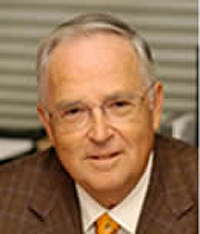The Last Act Crowns the Play
Hugo Salinas Price
 For uncounted ages, the world's thinkers accepted, unquestioningly, the fact that human life is what it is, and cannot be changed: that its nature is unalterable. For uncounted ages, the world's thinkers accepted, unquestioningly, the fact that human life is what it is, and cannot be changed: that its nature is unalterable.
Roman Emperor Constantine the Great (306 -337 AD) legalized Christianity but allowed the existence of other religions. Emperor Theodosius I made Christianity the official religion of the Roman Empire in 380 AD; other religions were considered foolish.
The ancient view regarding the unalterable condition of earthly human life continued to prevail, but a new and powerful element was introduced into human life during the reigns of Constantine and Theodosius I: the element of Hope for humanity, the hope of eternal and blessed life after death for those who accepted Christ as their Savior.
The ancient view of human life as unalterable continued to prevail in Europe up until the "Renaissance of Learning" in the 16th Century.
The Renaissance (i.e. "the re-birth") of Learning was made possible by the invention of the printing-press in 1452, by Gutenberg. The reading of books led in turn, to an intense interest in the nature of the physical universe and to the development of experimentation; experimentation became a feverish occupation of thinkers who proceeded to create physical inventions for the manipulation of the physical world.
By the 18th Century, the progress of Physics had so overwhelmed the Western World, that the idea that the nature of human life was unalterable came into discredit. "Progressive" thinkers began to outline new systems which they thought would change human life - previously thought to be unalterable - to an improved condition.
It was these "Progressive" thinkers who generated the French Revolution: in an "Age of Reason", it was unacceptable to hold on to the ancient view, that human life is essentially unalterable.
Intellectually, our present age functions as an extension of the idea which was the seed for the French Revolution: that human action on the part of the State can and should be taken to improve human life and eliminate its trials and tribulations; the opinion of most thinkers today, is that only "reactionaries" can object to Progress, and Progress will come with State action to improve the lot of humanity, and lift it out of the suffering implicit in human life.
This is where we stand today; this is why things are the way they are today, with World Debt standing at $325 Trillion dollars, and World Gross Domestic Product at only $100 Trillion dollars: the whole world is under the spell of the mistaken idea that human life can be altered, from what it is and must be, to an improved state of universal, worry-free bliss. Such an unrealistic objective has to be financed with equally unrealistic money.
Our world cannot, and will not be able to return to a "Gold Standard", until the world's Progressive thinkers die off, and the world once again realizes and embraces the truth - that the nature of earthly human life is unalterable: that some humans will be wealthy, and others poor. That some will be happy, and others miserable. That some will wine and dine, and others will have to starve.
That who does not work, shall not eat. That misery cannot be eliminated but only attenuated when humans work together in peaceful collaboration.
It seems to me, that the world will not give up its unrealistic fantasies, of health-care for all, food for all, education for all, housing for all, income for all, pensions for all, until a huge disaster overtakes humanity and carries off a large percentage of the world's population. Only then, will humanity once again be forced to accept the fact that human life is problematic and that nothing can be done to change that fact.
"My soul, sit thou a patient looker-on;
Judge not the play before the play is done:
Her plot hath many changes; every day
Speaks a new scene; the last act crowns the play."
Francis Quarles, 1592 -1644.

Mr. Hugo Salinas Price has been Honorary President of Grupo Elektra S.A. de C.V. since 1993. In 1997, Mr. Salinas Price founded the Asociacion Civica Mexicana Pro-Plata A.C., and serves as its President. He serves as Honorary Chairman of the Board of Directors at Banco Azteca, S.A., Institución de Banca Múltiple. He has been a Related Director of Grupo Elektra S.A. de C.V. since 1993. From 1952 to 1987, Mr. Salinas Price served as a Director of Grupo Elektra S.A. de C.V. He served as a Director of Banco Azteca, S.A., Institución de Banca Múltiple. Mr. Salinas Price holds degrees from Wharton and ITESM and a degree in Law from the Universidad Nacional Autonoma de Mexico ('UNAM').
www.plata.com.mx
| 



